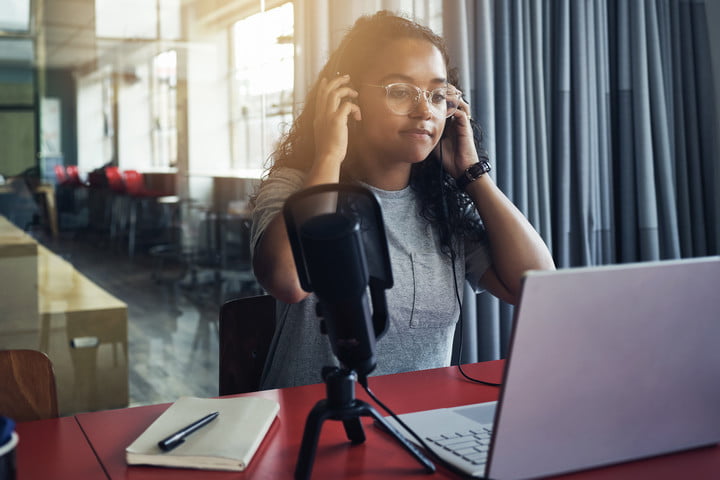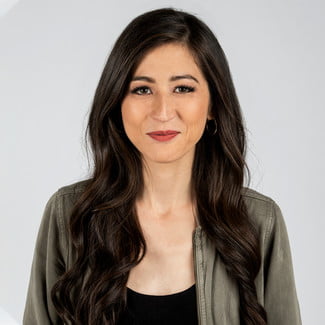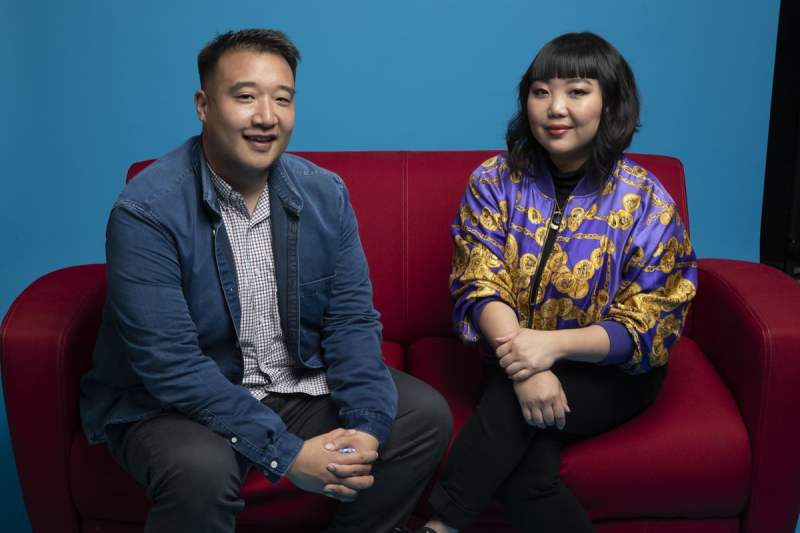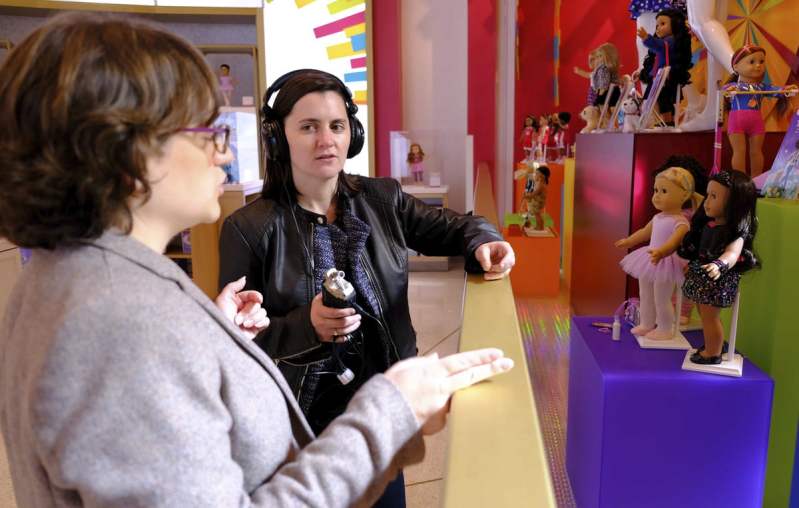
“I know this time of self-isolation is hard and scary for people, but however bad you are feeling, please, please don’t consider starting your own podcast,” Derry Girls actress Nicola Coughlan recently joked on Twitter. “Straight men under the age of 35 are particularly vulnerable to this and we all need to be vigilant of the dangers.” Some of the backlash to her tweet was swift and cruel, even though lots of people have made similar observations.
It may seem obvious that podcasting is one realm of the entertainment industry that will do just fine in the era of social distancing due to the novel coronavirus, officially known as COVID-19. Frequent listeners can probably rattle off a few shows that regularly record remotely, anyway.
“We don’t yet know how COVID-19 will affect podcasting,” said Tom Webster, senior vice president of Edison Research, which researches audience numbers for podcasts, in an email. “But I would say this: I’ve seen people assume that podcast consumption will go up as we have all of this time at home. I wouldn’t make that assumption.”
“I think podcasts are in a unique position right now, given that we can keep putting out content of the same caliber that we were before.”
Many people have had their usual routines disrupted. Those who usually listen to podcasts during commutes or at the gym aren’t doing either these days. Sports and travel podcasts have a lot less content to offer listeners.
Despite the uncertainty — and jokes — quite a few people are starting podcasts, like actor Kumail Nanjiani and his wife and writing partner, Emily V. Gordon. Other creators are carrying on as usual, offering their deep catalogs to anyone looking for more content to consume. Still others are making adjustments, especially those who spend a good chunk of time touring.
Podcasts Will Go On
“I haven’t heard of anybody here, locally, who’s actually canceled doing episodes,” said Jason Rigden, who runs the Seattle Podcasters Guild. In fact, he’s seen an increase in traffic to his directory of podcasts.

Even with leagues suspending or pushing back seasons for sports like basketball and hockey, sports reporter Mina Kimes is still finding plenty to podcast about for her shows ESPN Daily and The Mina Kimes Show. She’s focused on finding the right mix of the day-to-day, like the NFL free agency news, and broader stories about how hiatuses are affecting sports and players. “Our plan is to keep publishing,” she wrote in an email. “I think podcasts are in a unique position right now, given that we can keep putting out content of the same caliber that we were before.”
Stephen Smyk, senior vice president of podcast and influencer marketing at audio advertising company Veritone One, said it’s too early to tell how fewer people commuting and stagnation in certain types of industries will affect podcasting overall. “But early on, the large hosting companies that are responsible for hosting lots and lots of podcasts are saying, overall, traffic is up and listeners are up,” he said.
New Podcasts About the New Normal
Much like during impeachment, news agencies have started creating event-specific podcasts. NPR has its Coronavirus Daily podcast, which gives updates in about 10 minutes. The upcoming Home Cooking will help you whip up quarantine meals. Epidemic brings analysis from epidemiologist Dr. Celine Gounder and former ebola response coordinator Ronald Klain. “The number of shows that are popping up is just amazing,” said Smyk.
“There was a moment, I think, on sort of Thursday night, Friday morning of March 6, where I just thought, ‘What are we doing? What should we be doing?” Gabriel Spitzer told Digital Trends. Usually, he hosts Sound Effect on Seattle’s KNKX, which he described as a This American Life-style show that’s “purposely a bit removed from the news.”
Now, he and his team have quickly pivoted to Transmission, which focuses on life in the Seattle area during the outbreak. The new show interweaves personal stories with reporting. Sometimes the snippets come from Spitzer and Ashley Gross, who’s KNKX’s education reporter and is married to Spitzer.
"So the TB sanitarium was a party compared with a retirement home in 2020." Episode 4 of Transmission: Lessons Learned .https://t.co/PVIha01mQP
— Gabriel Spitzer (@gabrielspitzer) March 25, 2020
“It’s the most gigantic story on both of our beats at the same time,” he said. They’re also now trying to homeschool their two kids. “And we got a new puppy while we’re at it,” Spitzer said.
As a reporter, Spitzer is also trying to figure out how to work from home. “A classic radio trick that we’re using is to basically throw a blanket over your head when you’re recording,” he said. “It’s like an instant, soundproof voice-over booth.” Some stories, like the recent joint episode with the Outsiders podcast, required venturing into the field. It was a balancing act, to keep both the reporter and the people experiencing homelessness safe. “There’s just no way to get the voices of unsheltered people without going out there,” said Spitzer. They used long-range microphones for the interviews.
An Unexpectedly Topical Podcast
Frank Shyong is another reporter who’s not used to working from home. The L.A. Times columnist felt under the weather and was self-quarantining. “It’s a weird position to be in as a reporter, because normally for a story like this, I’d get in the car and report until I have a story,” he said. “But I am not supposed to do that.”

He and Jen Yamato have a new podcast, Asian Enough, that they’ve been recording for about six months. They interviewed Asian-American celebrities, mostly before everyone was focused on COVID-19. “In the end, we kind of decided that, even though it has more of a pop-culture orientation, there couldn’t be a more important time to talk about being Asian-American right now because of the widespread xenophobia around [coronavirus],” Shyong said. There have been attacks against people of Asian descent as misinformation about the coronavirus spreads.
Promoting a new podcast right now can be tricky, he said. Events they’d been planning for its debut have been canceled. Shyong had hoped to rent a banquet hall for a “dim-sum crawl.” Despite a more subdued debut, they’ve had a good response to the first couple episodes. Yamato shared a tweet about their episode with actor John Cho that’s “making the rounds on Korean Twitter.”
“… There couldn’t be a more important time to talk about being Asian-American right now because of the widespread xenophobia around [coronavirus]”
In addition to conversations with Cho and director Lulu Wang, Shyong and Yamato also interviewed L.A. Times health reporter Soumya Karlamangla about the effects of the outbreak on the Asian-American community. Future episodes will feature such celebrities as Margaret Cho, Padma Lakshmi, Jet Tila, and Rabia Chaudry.
“Asian-American is sort of a demographic grab bag,” said Shyong. “We have all these different languages, nationalities, and cultures.” There are also differences, he said, between first-, second-, third-, and fourth-generation Asian-Americans. “I think what we share is the idea that we are misunderstood, you know, that there is something that that needs to be said out there and that that space should exist for them to say that.”
Because Truth Is Stranger Than Fiction
“Obviously, with everything going on, we had noticed kind of a general uptick in numbers starting about two weeks ago,” Rob Herting told us. He and David Henning started podcast publisher QCode, which focuses on audio fiction. In the past week, there was an even greater rise in their numbers, Herting said: “It’s been really significant.”
QCode has a new show debuting on March 23, The Left Right Game, starring Tessa Thompson. “Our content being fiction, we really feel like it’s a form of escapism right now,” said Herting. The company’s shows include Carrier, Gaslight, and Blackout, which stars Rami Malek and feels somewhat related to many people’s current situation. In the show, civilization is turned upside down by a nationwide power outage.
The company just completed production on a new recording facility, which it obviously won’t get to use for the foreseeable future. “Unfortunately, it’s like getting a present that you can’t open for quite a while,” said Henning. Still, they plan to press forward with new shows. In fact, QCode could accelerate the pace of some upcoming podcasts, like Borrasca, which stars Riverdale’s Cole Sprouse. “Unlike a film or television production, where you need dozens, if not hundreds, of people kind of congregated, we don’t necessarily need that,” said Herting.

The atmosphere in states like California and Washington started changing earlier than in other parts of the country. It was something Welcome to Night Vale’s Joseph Fink noticed after going to see a play with his mother in Santa Monica. “This was only a little over a week ago, but it feels like such a different time,” he said.
On the drive home, he came up with the idea for a new show, Our Plague Year. It brings together stories from fiction writers, even as the authors stay apart. “I mean, my impulse is always to make stuff,” Fink said. “That’s kind of the one thing I’m good at.” He sees the new podcast as a kind of throwback to podcasting’s early days. “It has become such a business, with so many different fingers in it, and everything’s become so complicated,” he said, “and there was something really appealing, at this moment, of just going back to how Night Vale was originally made, which was just, ‘Hey, let’s make a thing and see if people want to listen to it.’”
For the new show, Fink emailed writers he knew and quickly assembled the first episode. “I currently don’t have any way of monetizing this,” he said. “I’m just kinda hoping it’ll be useful for people because I think it’s maybe useful for me.”
Welcome to Night Vale was at the start of a world tour when social distancing measures started. A good deal of the show’s income comes from live events, Fink said. But he’s also worried about the actors, musicians, lighting techs, and theater owners.” Live entertainment can only be done in a room together,” he said. “You can livestream, but it’s not a good replacement.” A livestream doesn’t pay for a theater’s valets or bolster the restaurants that rely on the post-show crowd. “This is a problem on a scale that cannot be solved by individuals or individual businesses,” Fink said. “It just can’t.”
For podcasters who rely on advertisers for their revenue, they may see some changes, though Smyk of Veritone said many of the company’s clients have long-term relationships with hosts. Still, certain types of companies — like those in the travel industry — might pull back for now. “Some of the larger advertisers in the podcast space are in industries that have been and will be immediately impacted,” said Smyk. “So there will be some pain in the industry, without a doubt.” However, he’s also seen some new interest from software companies, as more people being working from home.
To Escape or to Inform?
Dr. Mary Mahoney and Dr. Allison Horrocks have been talking a lot about how to balance information and entertainment in their American Girls podcast. “I think, because we record remotely, that’s been somewhat unchanged, but I think what has changed is kind of the response we’re having from listeners about what we should talk about,” said Mahoney. The two historians have always mixed their expertise with pop culture while rereading historical books.

Currently, they’re talking about Addy, who escaped slavery and whose stories are set in 1860s Philadelphia. The setting is an opening to pandemics, said Horrocks, given the city’s history with disease and disease containment. “We talked about the pandemic, but we also talked about the history of ice cream, because in the book, Addy has ice cream for the first time,” she said. “So I think that balance, particularly, is comforting to some people in a way that if you were looking for just the history of pandemics, there probably are other outlets for you.”
It’s a question Mahoney has thought about in her own research. “My training, specifically, is on the history of bibliotherapy, which is the use of books as medicine,” she said. “So the idea that the ways in which we would define culture to be therapeutic, whether it’s pop culture or otherwise, is something I’m interested in.”
“Like, if you love a podcast and you reach out to [the creator], chances are they actually will write back …”
It’s been debated, she said, whether reading a book about depression when you’re suffering from depression is helpful or not, because it might inform you or magnify your feelings. “In other words, should you be distracted from it or will you find some kind of solace from learning more about it?” she said.
Not only are more listeners tuning in to podcasts, more of them are reaching out on social media than usual, said Horrocks. “I think part of what draws people to
How to Unwind?
Here’s what content creators are consuming when they’re not making their own shows or looking at the news.
Joseph Fink
- Rude Tales of Magic (podcast): It’s just very, extremely silly and funny and exactly what I need at this moment.
- Bone by Jeff Smith (graphic novel): It’s like if some newspaper comic characters, like Calvin and Hobbs or Farside-type characters, suddenly showed up in a Lord of the Rings-type fantasy.
Mary Mahoney
- Murder, She Wrote (TV show, Amazon Prime): “It is completely insane and a really good escape. I mean, the accent, is — as an actual New Englander, to hear the accents they imagine New Englander’s have is really off the wall. And that’s truly the least of it on this show — not even getting into the plotlines, the acting, all of it.”
Gabriel Spitzer
- Futurama (TV show, Hulu): “My kids are really into Futurama, and so I’ve been watching Futurama episodes with them pretty regularly … I’ve been pretty all business when it comes to my listening habits lately, to be honest. But I’m sure the time will come when I’m just going to be so fed up, I’ll just need to go and watch Fleabag or whatever.”
Allison Horrocks
- Little Women (Book and movie, Amazon Prime or YouTube): “We’ve been doing some research on the Alcotts, because we’re doing a special bonus episode about the Little Women movie and Louisa May Alcott. So I’ve actually found those books pretty comforting, because it’s a story I love and I love learning new things.”
- Crime Writers On … and Lore (podcast): “My podcast realm that I hang out in is mostly true crime and folklore, so things like Crime Writers On … and Lore. And I’ve been watching a lot of true crime on Netflix. So mine are kind of not the most comforting things to most people.”
Mina Kimes
- Westworld (TV show, HBO): “I’m happy that Westworld started back up — I need all of the free time just to try and understand what’s happening on the show.”
- Halt and Catch Fire (TV show, Netflix): “I also went back and started the AMC series Halt and Catch Fire from the very beginning.”
- Pack Your Knives (podcast): “And Top Chef is back! My friend and colleague Kevin Arnovitz has a Top Chef podcast called Pack Your Knives that I highly recommend.”


